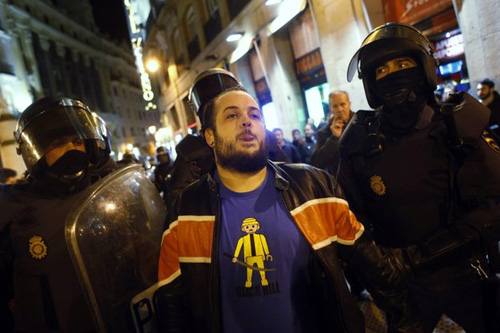
Fight Racism! Fight Imperialism! 237 February/March 2014
On 13 January 2014, Spanish President Mariano Rajoy visited the US White House for the first time. The Spanish delegation brought entrepreneurs from major companies to meet their US counterparts, in the hope of persuading them to invest in Spain. Rajoy tried to enhance the figures, which show a slight economic growth of 0.3%. Obama praised the effort but pointed out the challenge of reducing unemployment. The most recent official figures show an employment rate of only 44%, with many of these underemployed. Overtime is unpaid and there is a worrying growth of one-day contracts. The arrogance and corruption of the political class, in conjunction with the appalling conditions in some working class areas are fuelling popular unrest. JUANJO RIVAS reports.
In previous issues of FRFI we have reported how poverty has increased abruptly since the beginning of the crisis, but also how some deprived sections of the population were organising to fight for their rights. Families who were ruined by banks selling fraudulent hedge bonds are fighting back. Miguel Blesa, former director of bankrupt Bankia, led this practice and was sent to prison for the irregular purchase of the City National Bank of Florida. He also funded the construction of the only foreign branch of the London School of Economics in Madrid, which was never even half built and created a huge debt. On 24 January he was set upon by pensioners who had lost all their savings, as he attended a court hearing. They hit him with a placard and shook him before the police rushed to protect him.
After two years of constant cuts in public services, the conservative agenda has turned to attacking civil liberties, with the draconian ‘Law of Citizen Security’ aimed at criminalising protest (see FRFI 236). The radical advocates of austerity are also deeply conservatives on social issues. The new reactionary abortion law, which prohibits abortion except in extreme circumstances, has drawn criticism from European institutions, winning praise only from the French extreme right-winger Marine Le Pen. Meanwhile, the lengthy crisis has given rise to a more visible fascist presence, camouflaged as a populist social movement so as to gain support in working class areas. In a northern suburb of Madrid, fascists run a soup kitchen ‘only for Spanish nationals’. The conditions are developing for the rise of a strong fascist organisation like Golden Dawn in Greece, with signs of a split from the right in Rajoy’s People’s Party.
On the verge of revolt
The working class neighbourhood of Gamonal, in the town of Burgos, had seen the development of a speculative project to build a boulevard and an underground parking lot that are irrelevant to the real needs of local people. Furthermore, the concession was granted to a developer already convicted for corruption. In January, local people – outraged at a budget geared towards speculation rather than social services – began to protest. Soon the pressure increased, with 24-hour pickets and surveillance that brought street works to a halt. Neighbours decided to run collective meals on the streets, organise mass assemblies and patrol the area to ensure the project would not go ahead. In response, the mayor ordered indiscriminate police charges, including against elderly people and those just passing by. This repression was the spark needed to set the protest on fire: the youth responded by building barricades, smashing banks and throwing rocks at the police. Between 12 and 14 January, police hit people at random, shot rubber bullets, entered properties to beat people up and made 40 arrests, many of bystanders. The mainstream media portrayed protesters as ‘violent’ and ‘professional rioters from other parts of the country’, for fear the protest spread elsewhere. However, it continued and on 17 January the mayor of Burgos halted construction. The same day, dozens of towns expressed their solidarity in militant marches this ended in more skirmishes and attacks on banks, with more arrests and around 20 people wounded. In Barcelona, activists defended themselves from police by throwing stones and bottles. For the first time police used ‘ultrasound cannons’ to disperse crowds. As unrest spreads, state repression is increasing.
More people are losing their fear of directly challenging repressive laws. In December, a march that attempted to surround Congress in Madrid ended with rubbish bins being burned and a police car attacked. In January, demonstrations in favour of free abortion were once again baton-charged by police in the area around the headquarters of the conservative party, and youth fought back. On 11 January, around 150,000 people demonstrated in Bilbao for the rights of Basque prisoners.
People chant ‘The struggle is the only way forward.’ The constant pressure exerted by health care workers and the general population in Madrid have proved this right. On 28 January, the courts turned down a project to privatise six hospitals, while crowds celebrated in the streets and congratulated the staff.
There is a real chance for the movement to strengthen itself and find new ways to build in the neighbourhoods and communities. In March, farmers, miners, seasonal workers and unemployed people and others will set off on a ten-day march to Madrid. The ‘March of Dignity’ rejects the policies of austerity and the bank bailout and demands investment in quality public services. On 22 March, thousands are expected in the capital from every corner of the country, to show that hope and unity can defeat capitalist policies.




